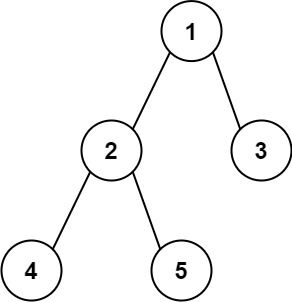Welcome to Subscribe On Youtube
543. Diameter of Binary Tree
Description
Given the root of a binary tree, return the length of the diameter of the tree.
The diameter of a binary tree is the length of the longest path between any two nodes in a tree. This path may or may not pass through the root.
The length of a path between two nodes is represented by the number of edges between them.
Example 1:

Input: root = [1,2,3,4,5] Output: 3 Explanation: 3 is the length of the path [4,2,1,3] or [5,2,1,3].
Example 2:
Input: root = [1,2] Output: 1
Constraints:
- The number of nodes in the tree is in the range
[1, 104]. -100 <= Node.val <= 100
Solutions
Similar to problem 687. Longest Univalue Path.
-
/** * Definition for a binary tree node. * public class TreeNode { * int val; * TreeNode left; * TreeNode right; * TreeNode() {} * TreeNode(int val) { this.val = val; } * TreeNode(int val, TreeNode left, TreeNode right) { * this.val = val; * this.left = left; * this.right = right; * } * } */ class Solution { private int ans; public int diameterOfBinaryTree(TreeNode root) { ans = 0; dfs(root); return ans; } private int dfs(TreeNode root) { if (root == null) { return 0; } int left = dfs(root.left); int right = dfs(root.right); ans = Math.max(ans, left + right); return 1 + Math.max(left, right); } } -
/** * Definition for a binary tree node. * struct TreeNode { * int val; * TreeNode *left; * TreeNode *right; * TreeNode() : val(0), left(nullptr), right(nullptr) {} * TreeNode(int x) : val(x), left(nullptr), right(nullptr) {} * TreeNode(int x, TreeNode *left, TreeNode *right) : val(x), left(left), right(right) {} * }; */ class Solution { public: int ans; int diameterOfBinaryTree(TreeNode* root) { ans = 0; dfs(root); return ans; } int dfs(TreeNode* root) { if (!root) return 0; int left = dfs(root->left); int right = dfs(root->right); ans = max(ans, left + right); return 1 + max(left, right); } }; -
# Definition for a binary tree node. # class TreeNode: # def __init__(self, val=0, left=None, right=None): # self.val = val # self.left = left # self.right = right class Solution: def diameterOfBinaryTree(self, root: TreeNode) -> int: def dfs(root): if root is None: return 0 nonlocal ans left, right = dfs(root.left), dfs(root.right) ans = max(ans, left + right) return 1 + max(left, right) ans = 0 dfs(root) return ans -
/** * Definition for a binary tree node. * type TreeNode struct { * Val int * Left *TreeNode * Right *TreeNode * } */ func diameterOfBinaryTree(root *TreeNode) int { ans := 0 var dfs func(root *TreeNode) int dfs = func(root *TreeNode) int { if root == nil { return 0 } left, right := dfs(root.Left), dfs(root.Right) ans = max(ans, left+right) return 1 + max(left, right) } dfs(root) return ans } -
/** * Definition for a binary tree node. * class TreeNode { * val: number * left: TreeNode | null * right: TreeNode | null * constructor(val?: number, left?: TreeNode | null, right?: TreeNode | null) { * this.val = (val===undefined ? 0 : val) * this.left = (left===undefined ? null : left) * this.right = (right===undefined ? null : right) * } * } */ function diameterOfBinaryTree(root: TreeNode | null): number { let res = 0; const dfs = (root: TreeNode | null) => { if (root == null) { return 0; } const { left, right } = root; const l = dfs(left); const r = dfs(right); res = Math.max(res, l + r); return Math.max(l, r) + 1; }; dfs(root); return res; } -
// Definition for a binary tree node. // #[derive(Debug, PartialEq, Eq)] // pub struct TreeNode { // pub val: i32, // pub left: Option<Rc<RefCell<TreeNode>>>, // pub right: Option<Rc<RefCell<TreeNode>>>, // } // // impl TreeNode { // #[inline] // pub fn new(val: i32) -> Self { // TreeNode { // val, // left: None, // right: None // } // } // } use std::rc::Rc; use std::cell::RefCell; impl Solution { fn dfs(root: &Option<Rc<RefCell<TreeNode>>>, res: &mut i32) -> i32 { if root.is_none() { return 0; } let root = root.as_ref().unwrap().as_ref().borrow(); let left = Self::dfs(&root.left, res); let right = Self::dfs(&root.right, res); *res = (*res).max(left + right); left.max(right) + 1 } pub fn diameter_of_binary_tree(root: Option<Rc<RefCell<TreeNode>>>) -> i32 { let mut res = 0; Self::dfs(&root, &mut res); res } }